Panjab Flood Toll: 29 Lives Lost, 16K People Evacuated & 300K Acres Crops Destroyed
Panjab: Flood toll 29, 300K acres submerged; Indian govt offers no flood relief; AAP largely absent; Trump additional tariff kicks in. Sikh: Kartarpur Gurdwara inundated and cleaned; Mahan Kosh controversy; Malaysian Sikh band—and other stories.
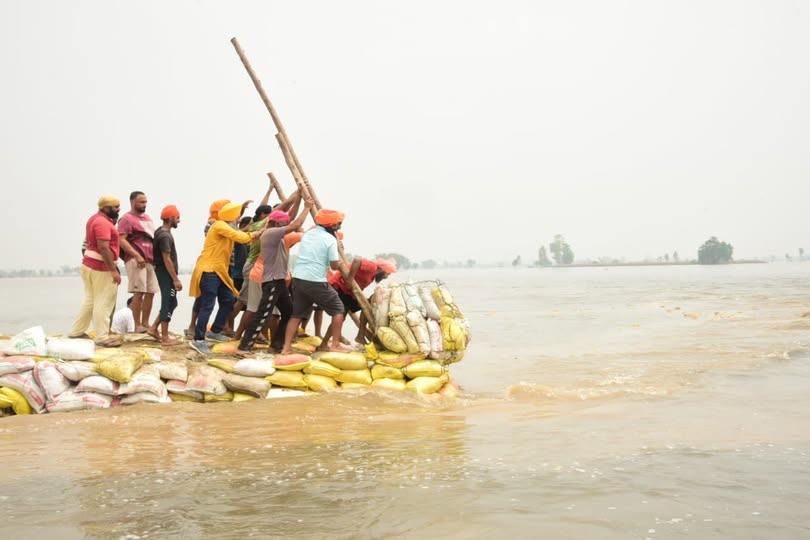
Panjab Flood Toll: 29 Lives Lost, 16K People Evacuated & 300K Acres Crops Destroyed
Panjab is battling one of its worst floods in recent years, with 29 lives lost and more than 15.6K people evacuated across 12 districts after incessant rains triggered large-scale devastation. The floods have displaced thousands of people, destroyed crops in 300K acres, caused severe damage to property, infrastructure, and livestock. According to Revenue, Rehabilitation, and Disaster Management Minister Hardeep Singh Mundian, nearly 256K people have been affected in 1,044 villages. There are multiple reasons for the floods in Panjab which are the flood plains of Himalayan states. One: reckless development on the lower Himalayas and denuding the mountains. Two: the Bhakra Beas Management Board (BBMB) controlled by the Indian Union Ministry of Power currently headed by Manohar Lal Khattar, former Chief Minister of Haryana. BBMB governs the Bhakra Dam on river Satluj and Pong Dam on river Beas. Punjab State Power Corporation Limited governs the Ranjit Sagar Dam on river Ravi. Bhakra and Pong store extra water because non-riparian states Haryana and Rajasthan lay claim on them owing to the flawed Punjab Reorganisation Act, 1966. This reduces the dams’ capacity to accommodate heavy inflow and as reservoirs reach the danger mark, they release huge amounts of water. Three: the Panjab government has not desilted its rivers in the last sixty years. Four: legal and illegal mining have weakened riverbanks so water spills over to agricultural lands, villages, and towns. Five: disputed ownership of parts of land on riverbed where people claim ownership but govt denies it. Six: lack of preparation by Panjab govt though the Metrological Department had predicted heavy rains. Panjab received 1272% extra rain on 30-31 Aug. Though Panjab has seen floods in 2019, 2023 and now, the comparison of these floods is being made to the 1988 floods when the Bhakra Dam had opened its gates up to 20 feet to release extra water. The floods have now moved from rivers Ravi and Beas in north Panjab to river Satluj in central Panjab. Rains will continue until 5 Sept (earlier coverage).
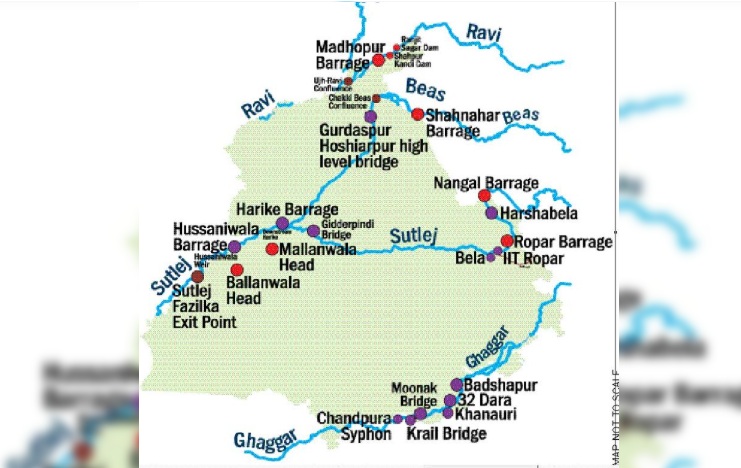
No Word From Union Govt, AAP Largely Absent; Pathanmajra Side Show
The Indian union government has not yet declared the floods in Panjab or north Indian states a National Emergency or made any special grants. After 10 days since severe floods started in Panjab, the Indian Prime Minister has now assured help. On 27 Aug, the Panjab Chief Minister Bhagwant Singh Mann made a show of donating his helicopter for flood relief in Gurdaspur but that just drops a few packets of food, that too in water. Aam Aadmi Party (AAP) chief Arvind Kejriwal has not visited Panjab. On 2 Sep he just urged his party workers to arrange relief for Panjab and committed one month’s salary of all elected representatives towards flood relief. The Panjab Indian National Congress (INC) had already committed that on 28 Aug. The Haryana Chief Minister Naib Singh Saini expressed solidarity but that means little because true solidarity would be if Haryana and Rajasthan accept their non-riparian status on Panjab’s rivers and give up their illegal claim on Panjab waters. That is how Panjab’s dams will not be used to store water for their use. They will not be filled to the brim. The flood gates will not be opened only when the reservoirs reach danger mark. Meanwhile, on 30 Aug, AAP Member of Legislative Assembly (MLA) Kuldeep Singh Dhaliwal visited flood-affected areas in Ajnala, Amritsar. Former Jathedar (leader) and Darbar Sahib (Golden Temple) head granthi (reciter) Giani Raghbir Singh was with Dhaliwal who requested an Ardas (prayer) for Panjab; the emotional toll was so high that Giani Raghbir broke down while performing Ardas. Concurrently, on 31 Aug, Sanaur, Patiala AAP MLA Harmeet Singh Pathanmajra spoke out against Principal Secretary for Water Resources Krishan Kumar. Pathanmajra said he had requested Kumar to get the Tangri rivulet desilted and cleaned but to no avail and that Delhi-based AAP leadership was 'illegitimately ruling over Panjab.' On 2 Sep, a First Information report was filed against Pathanmajra over rape, cheating, and criminal intimidation in a three-year-old case and he was arrested. The signal is to other AAP MLAs and leaders to not speak against the party.

Resilient Panjab Fights Back Floods, Horrors Yet to Unfold
In the absence of the Indian union government’s support and in the face of a largely absent state govt, the people of Panjab have been fighting the floods on their own. The scale of effort and hard work is huge. For example in Sultanpur Lodhi's Mand area farmers joined hands to protect their crop on 4.2K acres of land by raising temporary bundhs (embankments). The farmers made an eight-km-long bundh along Baja village. Devastating floods in villages along Beas in 2023 had prompted these farmers to desilt their fields and construct embankments on their own. However as the waters rose up to 8-10 feet, many embankments broke and efforts were made in either arranging boats to rescue people or deliver rations to people stuck in their homes and fodder for cattle. Many in Amritsar district refused to leave their homes for fear of displacement and robbery. In Gurdaspur, the Indian army and National Disaster Response Force (NDRF) led efforts to rescue people. In Ferozepur and Fazilka the huge increase of water at the Harike Barrage—because gates were closed and water was not released to Rajasthan—left many villages cut off. Over 2K people and 8K livestock were rescued. On 1 Sep, farmer union Kisan Mazdoor Sangharsh Committee claimed they had forced the gates to be opened. Meanwhile, villages in Sahibzada Ajit Singh Nagar and Patiala districts have been placed on heavy alert after the river Ghaggar River crossed the 10-foot danger mark at Bhankarpur. This follows heavy rainfall in its catchment area and the opening of floodgates at Sukhna Lake, Chandigarh. There has been a huge effort on the part of the Panjabi community in Panjab, Inspora (outside Panjab in India), and the diaspora in sending relief material. However, the floods are on and the real horror of the devastation would be visible only when the rains stop and water recedes.
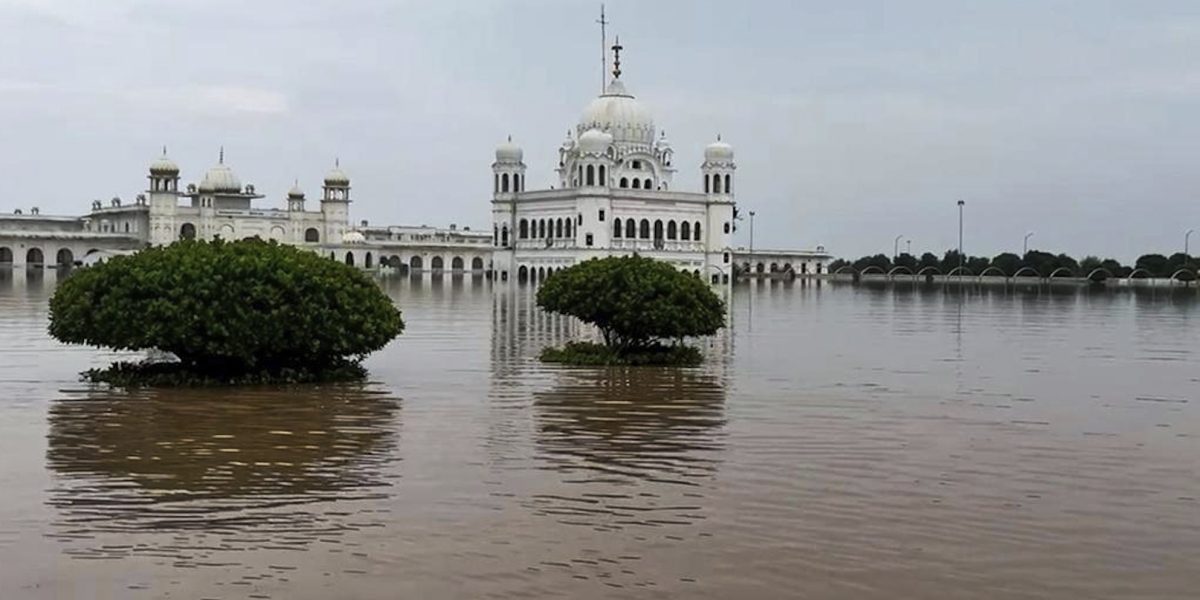
Kartarpur Gurdwara Inundated & Cleaned; Major Floods in Pakistan (West) Panjab
On 27 Aug, a breach in the river Ravi’s embankment in Narowal, Panjab, Pakistan caused severe flooding, inundating the Kartarpur Sahib complex associated with the first Sikh sovereign Guru Nanak. Gurdwara Darbar Sahib was flooded with water levels reaching 5-6 feet. This affected daily prayers and religious activities. The West Panjab Chief Minister Maryam Nawaz Sharif asked her team to clean the Gurdwara and all the water was drained out within a day. Pakistan Sikh Gurdwara Parbandhak Committee head and minister for Minorities Ramesh Singh Arora thanked the Pakistan Prime Minister, (West) Panjab CM, and the Chief of Army Staff for the service that Pakistan Rangers performed in cleaning the Gurdwara. He said, 'We have been asking India to send pilgrims (stopped since May 2025) but the Modi government sent 250K cusecs of water.' Services have resumed at the Gurdwara. The monsoon season has caused severe flooding in Pakistan killing at least 706 people and affecting over 1.4K villages. Pakistani authorities have evacuated more than a million people from homes in Panjab province. Torrential rain and India's release of excess water from its dams swelled rivers Chenab, Ravi, and Satluj that flow into (West) Panjab. In April, India had placed the 60-year-old Indus Water Treaty in abeyance over the terror attack in Pahalgam, Kashmir. The idea was that India would create a drought in Pakistan. However, the monsoons have shown that India cannot stop river waters. In fact, India passed on three flood warnings to Pakistan this week. On 27 Aug, two of the 54 gates of the Madhopur barrage, located downstream of the Ranjit Sagar Dam on river Ravi, gave way after heavy rains. The barrage, first built in the 19th century and rebuilt in 1959. This led to river Ravi carrying 14M cusecs of water, its highest ever. Rivers have their own memory and cannot be bound by political and national ideology (earlier coverage).
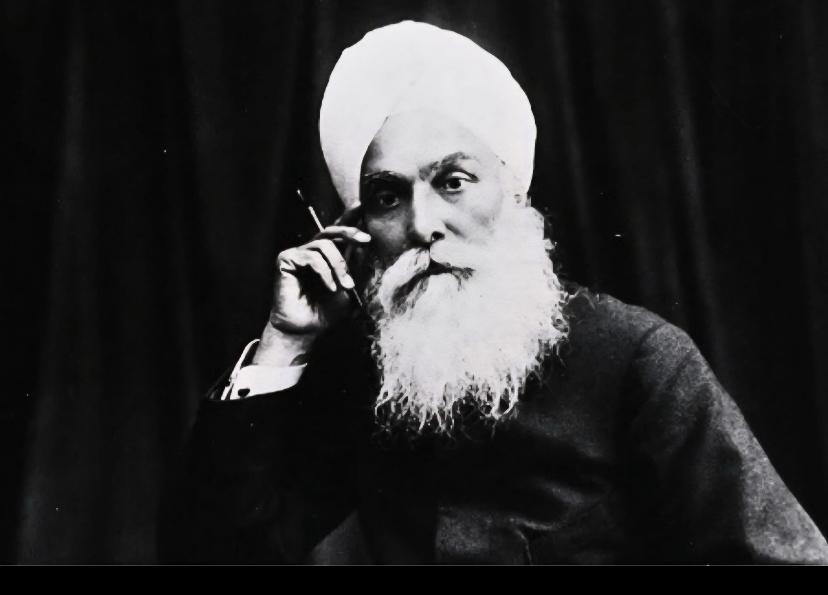
Controversy over Erroneous 'Mahan Kosh' Disposal
A controversy erupted at Punjabi University on 28 Aug after students spotted large pits being filled with copies of the university's reprinted Gurshabad Ratnakar Mahan Kosh (Sikh Encyclopedia) authored by Bhai Kahn Singh Nabha, first published in 1930. This sparked protests and allegations of 'desecration as it comprised hymns of Gurbani (verses of the Sikh holy text) and other religious texts.' The university clarified it was only complying with state government directions to dispose of the erroneous editions in an 'environment-friendly and biodegradable manner.' The reprinted Mahan Kosh's authenticity was questioned in 2012 after the university reprinted and translated the Mahan Kosh into Panjabi, Hindi, and English between 2006-13—in total 24,950 copies. Sikh scholar Amarjit Singh Dhawan and others first raised complaints of discrepancies then took the matter to court. In July 2017, an expert committee confirmed the presence of errors and recommended a permanent sale ban, pulping of copies, accountability for financial losses, and the creation of review panels for correction. The Shiromani Gurdwara Parbandhak Committee (SGPC) also pressed for a ban. Dhawan said, 'There were more than 30K mistakes in the reprinted Mahan Kosh. I welcome the university's decision to destroy these copies.' However, students protested the Mahan Kosh’s burial instead of cremation as per the Sikh code of conduct. Sri Akal Takht Sahib (Eternal Throne) and the SGPC have condemned the university's action. The Patiala police booked the university Vice-Chancellor (VC) Dr. Jagdeep Singh and officials involved in the Mahan Kosh burial. The VC has apologized. The university has suspended Dr. Harinder Pal Singh Kalra, Incharge, Publication Bureau & Press, and Mahinder Bharti, Director, Environment & Biodiversity Department for lapses. This raises the question if the Mahan Kosh is to be considered a holy text or these copies be seen as error-riddled texts which need to be disposed off in any suitable manner. These days, lines from Gurbani are on walls, posters, t-shirts, and apps which are not holy spaces. The larger issue is the need for an accurate and revised version of the Mahan Kosh in as many languages as possible which remains missing.
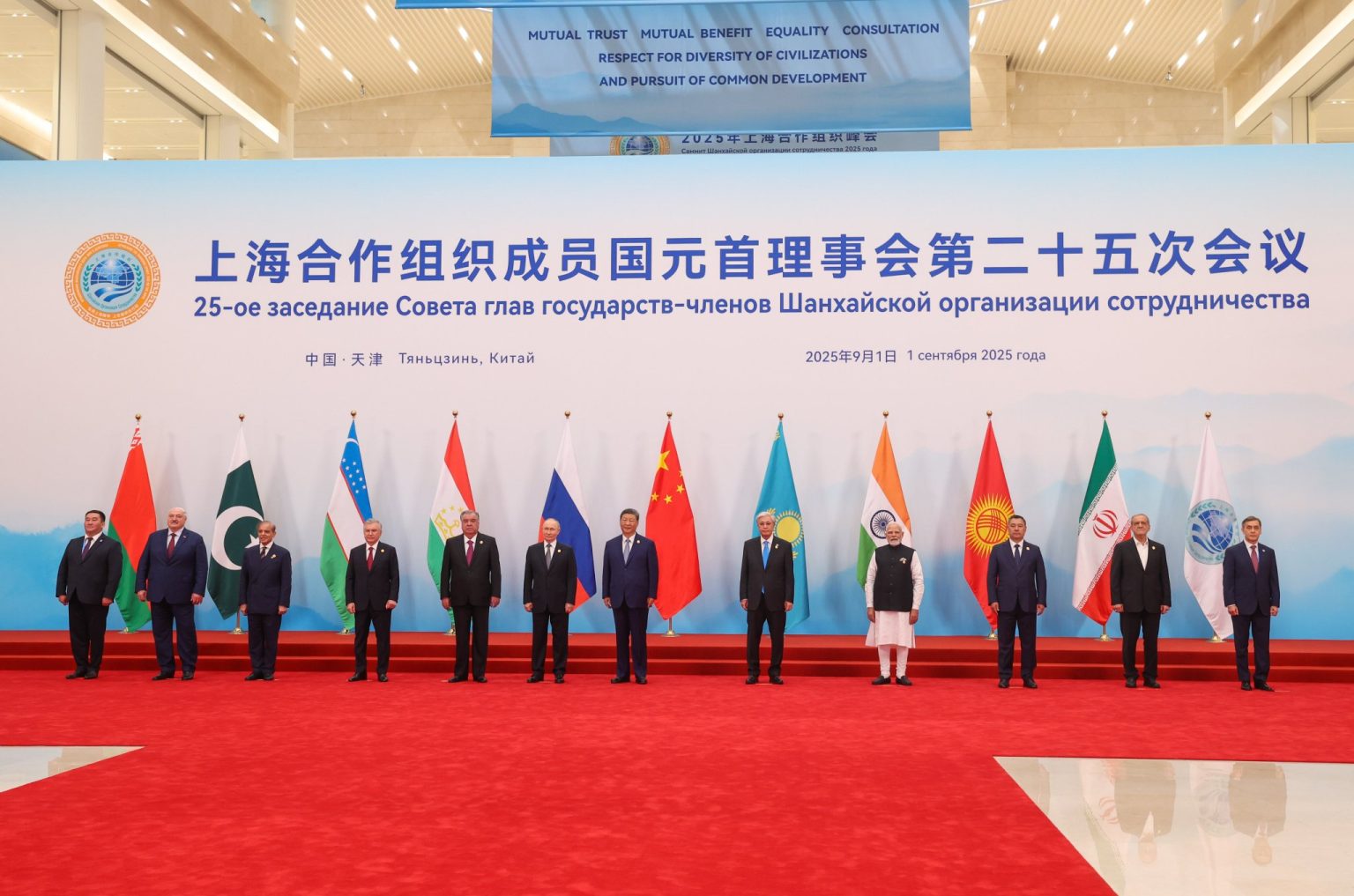
Trump’s Additional 25% Tariff Kick In; Modi at SCO in China
On 7 Aug, US President Donald Trump-led administration notified 25% additional tariffs on India’s exports to the US. This takes the total tariffs applicable on India to 50%. According to Credit Rating Information Services of India Limited (CRISIL), 'The imposition of higher tariffs by the US will significantly impact micro, small and medium enterprises (MSMEs), which account for as much as 45% of India's total exports. Of the five sectors expected to see meaningful impact, gems and jewellery (others being shrimp, textiles, automotive, and chemicals) has the highest exposure to the US at USD 10B. We expect export volumes to contract.' The additional tariffs are due to India continuing to buy Russian oil but petroleum is not affected by the tariffs. Agricultural produce worth USD 6B including Panjab’s Basmati, Kerala’s spices, and Assam’s tea are affected. With the fisheries harvest season round the corner, shrimp farmers in Panjab, already struggling to make the crop economically viable, now will struggle after the US tariffs come into effect. Trade estimates peg Panjab’s 2024 shrimp production at around USD 9M, with buyers offering an average best rate of USD 3.98 per kg. In 2025, this rate offered has come down to USD 3 per kg, attributed to the US government’s new taxation policy. As per officials and aquaculturists, engaged in cultivation of aquatic organisms such as fish, crustaceans, and shellfish like shrimp, the US is the biggest market for Indian shrimp. Meanwhile, after the snub by the US, India has been making overtures towards China and Russia. Indian Prime Minister Narendra Modi met Russian President Vladimir Putin and Chinese President Xi Jinping on 1 Sep on the sidelines of the Shanghai Cooperation Organisation (SCO) Summit 2025 in Tianjin, China. The three leaders exchanged handshakes, hugs, and smiles in a rare display of camaraderie. The SCO condemned the 22 Apr Pahalgam terrorist attack, extended condolences to the victims, and called for justice against those responsible. Yet, it did not call out Pakistan on whom India has attributed responsibility for the attack. Nor did it endorse India's Operation Sindoor (vermilion mark) in which China supported Pakistan (earlier coverage).
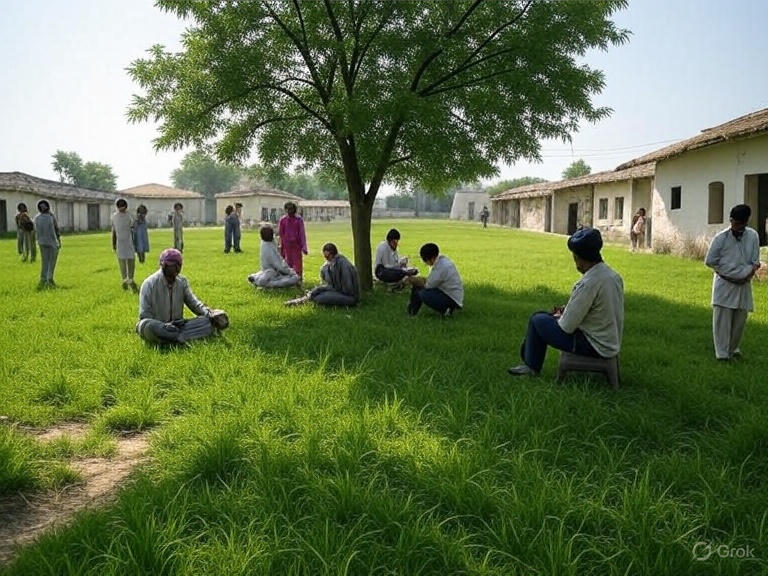
Govt Proposes to Auction Village Common Land, Opposed; Urea Issues
After the Panjab government's Land Pooling Policy failed, its Unified Building Rules have been opposed, they now propose to auction shamlat (common) land in villages. A letter from the District Development and Panchayat Officer on 25 Aug directs 17 panchayats (village councils) to pass resolutions on 26 Aug to sell their land via open auction, citing proximity to upcoming projects. Farmer unions and panchayat representatives from 17 villages in Sahibzada Ajit Singh Nagar district gathered at Gurdwara Amb Sahib on 28 Aug to oppose the administration’s directive to auction common land. The protest marked the launch of the Zameen Bachao, Pind Bachao (Save Land, Save Villages) Committee. Farmer leader Parmdeep Singh Baidwan warned that selling these lands would deprive villages of future spaces—like housing for poor families, playgrounds, and community centers. He said, ‘This is our heritage, a collective property passed down generations. It will not be sold at any cost.’ Meanwhile, despite officials claiming adequate fertilizer stock in Panjab, farmers in several districts alleged unavailability of subsidised urea. Farmers said, 'Urea is being diverted to industries or used other than farming purposes, leaving cultivators at the mercy of dealers, who exploit farmers by forcing unnecessary purchases.' Farmers said the official price of a 45-kg urea bag is USD 3.1, but 'we are forced to buy a bag at a price as high as three to four times.' Several dealers 'refuse fertilizers supply outright or agree only on the condition that additional, often non-required, agri-chemical is bought from them.' Panjab has more than 25K authorized fertilizer and pesticides dealers, including commission agents, and 3K cooperative societies officially tasked with distributing fertilizers. Apart from being a vital nitrogen-based fertilizer for crops, urea is also used in resin manufacturing, plywood, adhesives (like Fevicol), cattle feed, and even in some chemical processes. Technical-grade industrial urea is unsubsidized and costs significantly higher than agricultural-grade subsidized urea. Recently, a special team led by Chief Agriculture Officer Harkamal Pritpal Singh Bharot raided Satyam Industry in Khati village of Phagwara block and seized 95 bags of subsidized urea and 135 empty subsidised urea bags (earlier coverage).

LAPD Kills Sikh Man; UK to Investigate Sikh Charities
The Los Angles Police Department (LAPD) released a video dated 13 Jul showing a 35-year-old Gurpreet Singh performing Gatka (traditional Sikh martial art) with a machete on the Figueroa Street and Olympic Boulevard, Los Angles. After a stand off, LAPD shot dead Gurpreet. LAPD said Gurpreet abandoned his car in the middle of the road, waved the machete aggressively and, at one point, even appeared to slice his own tongue with the weapon. Officers said they repeatedly ordered him to drop the blade, but he refused to comply. Singh briefly returned to his vehicle, retrieved a water bottle and hurled it at police before driving off while sticking the machete out of the window. Officers launched a short pursuit during which Gurpreet drove erratically and collided with a police vehicle. Meanwhile, Indianapolis Sikh and Panjabi families say US Immigration and Customs Enforcement’s (ICE) arrests in their community increased this summer. At Gurdwara Guru Nanak Sikh Society, Komal Kaur, president of Umeed (Hope)—a Sikh-led mutual aid coalition supporting marginalized communities—said, 'Since January, our role has changed. We’ve been getting a lot of calls from individuals who need mental health support who are being detained.' Kaur added, 'We’re having a larger population of people detained by ICE that don’t speak any English at all. The language barrier adds to the distress and the confusion of navigating an already complex situation.' Kaur is working to find reputable experts and organizations who help people in custody or fearful of being arrested. Concurrently, in the UK, the Charity Commission has opened a statutory inquiry into unregistered charity Guru Nanak Gurdwara (also known as the Nanak Sikh Temple, amongst other names) established in 1980 and the Guru Nanak Gurdwara, Wednesfield. The Charity Commission itself was registered as a Charitable Incorporated Organisation in 2024. The Commission had previously opened a regulatory compliance case due to concerns raised by some of the Gurdwara’s congregation about the trustees’ oversight of the established, unregistered charity. The Commission says, trustees of both charities have failed to comply with regulatory guidance and with information gathering Orders of the Commission.

Indian Media's Anti-Sikh & Anti-Panjab Bias
This week two Indian media houses—The Tribune and The Print—displayed their bias against Sikhs and Panjab. In a piece titled Cops face jail terms for militancy-era killings, as Bandi Singh walk free, The Tribune equated those responsible for extrajudicial killings and enforced disappearances during Panjab's militancy years with Bandi Singh (Sikh prisoners). The article said 129 police personnel from constables to Deputy Inspectors General have been convicted over the past two years by a special Central Bureau of Investigation court in Sahibzada Ajit Singh Nagar. Another 60 officers remain on trial. While 82 of the 96 Bandi Singhs identified for release in 2014-15 were freed over the past five years. The remaining 14 include seven convicts in the 1995 assassination of former Panjab Chief Minister Beant Singh. The comparison is preposterous because the police officers engaged in human rights violations by killing innocents and claiming rewards and promotions. The Bandi Singhs took a position in a political struggle against the state and served multiple jail terms; their release is a matter of humanitarian concern. The officiating Jathedar (leader) of Sri Akal Takht Sahib (Eternal Throne) Giani Kuldip Singh Gargajj said the Punjab Police Welfare Association standing in favor of convicted police officers is unethical and unconstitutional. Similarly, on the US truck driver Harjinder Singh case, The Print published a column titled Should the govt get involved in the Harjinder Singh case? He’s no victim. The column asks: how involved should the Indian govt get when Indians abroad are charged with criminal offenses? It raises the point that since Harjinder does not stay in India, and was living in the US illegally, India should not care about him. It omits the fact that nationality is through birth unless changed by the individual. Apart from the human angle, remittances from truck drivers are a major line of sustenance for families in Panjab. It is not clear whether India intervened or not but there is little hope that Indian intervention will resolve anything in this case. India anyway has to resolve the high 50% tariff the US has slapped on India (earlier coverage).

Malaysian Sikh Pipe Band
Sri Dasmesh, the world’s largest Sikh pipe band, was founded in Kuala Lumpur in 1986. It was the brainchild of brothers Harvinder Singh and Sukdev Singh, who started it as a community initiative for youth. The main goals of the band were to instill discipline, create a safe space for young people, and give them the opportunity to travel across the world. The band started out by performing at local Sikh community events, but it wasn’t long before they began to gain wider recognition. Harvinder says, 'Our first major international trip was in 1989 when we were invited to Singapore for the opening ceremony of the Central Gurdwara, which was attended by Lee Kuan Yew, then Prime Minister of Singapore.' In 1990, the band was invited to play in the Malaysian National Day parade at Dataran Merdeka. The band took part in the parade under the banner of the Sikh Naujawan Sabha Malaysia (Sikh Youth Organization). Harvinder continues, 'Participating in the event gave us a lot of inspiration because we felt so Malaysian. Dr. Mahathir Mohamad was the Prime Minister, and all the ministers were there, and we had the opportunity to march past all of them.' Harvinder was the Pipe Major, responsible for coordinating all the music in the band, while Sukdev served as the Drum Major, leading from the front. Harvinder says, 'When we started piping, it was some localized version of Scottish tunes.' The turning point came in 2011, when a Pipe Major from Australia volunteered to train the band. Since then, the band has travelled to various countries to perform, including in 2015 at the National Anzac Day Parade in Sydney, Australia, where they led the Sikh contingent. That year, they also became the first band from Asia to qualify for the World Pipe Band Championships. In 2019, they were the first from Asia to win. On 31 Aug, Malaysian National Day, the band made history with Fortress of Dreams at Dewan Filharmonik Petronas—Malaysia’s first bagpipe concert. The day also marked 35 years since the band performed in the Merdeka parade.
Notes
Suggested Reading
Michael Le Page in New Scientist: Fewer than half the calories grown on farms now reach our plates.
Like what you're reading? Subscribe to our top stories.
Liv Forum provides a digest of analysis on major issues facing Indian (East) Panjab and Sikhs globally.
In accordance with our Privacy Policy, we will never share or sell the information of our subscribers.
PM Modi Visits Dera Sachkhand Ballan; BJP Wins Chandigarh Mayoral Elections
Panjab: PM Modi Visits Dera Sahkhand Ballan; BJP Wins Chandigarh Mayoral Elections; Trump Announced US Tariffs To Be Lowered; India-EU Sign FTA; CM Mann Invokes Bhai Kanhaiya in SYL Talks with Haryana. Sikh: Police Picks Up Two from Darbar Sahib; Panjab-based Sikh Organizations Commemorate 1986 Sarbat Khalsa—and more stories.
Delhi Court Acquits Sajjan Kumar in 4th 1984 Sikh Genocide Case
Panjab: Rally by independent journalists; Operation Prahar against gangsters & associates. Sikhs: Sajjan Kumar acquitted in 4th Sikh Genocide case; US Bill to prevent discrimination against Sikhs; UK report flags rising anti-Sikh sentiment—and more stories.


